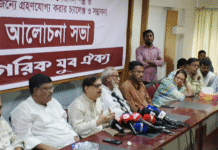COUNTDOWN TO ELECTION 2018-V
Foreign policies rank prominent in voters mind
Shahid Islam 12 October 2018 Weekly Holiday
Time may be a great healer, although at times it also adds to the afflictions one endures. Never before did the citizenry of Bangladesh bother so much about the regional and global policies pursued by their governments, as they have been in recent years.
The 2018 election knocks the door at a time reminiscent of the stories depicted aptly in Charles Dickens’ historical novel, ‘A tale of two cities’ (1859); which described the revolutionary thrustof the French republic as: “It was the best of times, it was the worst of times, it was the age of wisdom, it was the age of foolishness, it was the epoch of belief, it was the epoch of incredulity, it was the season of light, it was the season of darkness, it was the spring of hope, it was the winter of despair, we had everything before us..”
A quiet revolution
Few may agree Bangladesh today is having ‘everything before us,’ and, the nation is undergoing a quiet revolution; a metamorphosis of faith and fortitude, an unprecedented transformation of socio-political and economic articles of principles on which the societal anchor moored firmly for centuries. While the world too is changing, no other nation sacrificed its fundamentals as much as did Bangladesh in the last 10 years alone.
Today, people have no faith in voting, in democracy, in truthfulness, ethics, and the rule of law. Ask anyone what will happen in the next election: The answer, over 90 per cent of the cases or more, will be, ‘nothing’. This vacuous hollowness stems from drenched out desperations, from the numbness instilled by a virtual one party rule under which no other stakeholders had a say for years after years. In this ‘coercion-led ambiance’, winner took it all; transforming peoples’ minds into total inertness and irreversibleintrovertibity.
This was the quiet revolution; a structural deformation in which no one shouts or chants anymore to lodge a complaint, or to demand things that are demandable and overdue. Only one person says and decides loudly whether quota system in government services shall prevail, so to speak, or, whether a veritable neighbour should get or not whatever it asks for.
Domestic spins of foreign policies
Like the domestic policies, foreign policies too have been orphaned and abandoned in this quietly blown revolutionary whirlwind. Who would believe a country like Myanmar, with less than one-third of our population, will conduct genocide across the border and push millions of its own people into our land? The Myanmar military itself conducted, and does conduct, such atrocities. Yet, we never decided to send even a battalion strong of our army at the border as a show of deterrence. This alone shows how bankrupt a foreign policy we pursue.
One would think, not without justification, that foreign policies of any nation-state are the by-products of domestic desires and necessities. Not in Bangladesh. Here, you may not have the roads and the infrastructures to run your own vehicles, but allow you must a neighbour who is stuck between mainland and a periphery that can only be detoured with higher premium and greater risks; unless a neighbour is mapped into its transportation system, without any regard to, and respect for,the neighbours’ sovereign nuances and sensibilities.
China can aid and abet Muslim genocide in Myanmar, India can slaughter a Muslim citizen for carrying beef in the bag, secretly under fear. Yet, we must not raise a finger against them. That is the hallmark of our foreign policy, as it prevails now.
Internationally, you can smear and abuse even the only super power of the day; just because it spots out your dents in rights violations, or in being meek with another neighbour who perpetrates a genocide and dumps millions of its citizens into a neighbouring country through systematically – conducted ethnic cleansing of its minority population.
Decisive hours
These are realities that make the 2018 election a decisive one; one in which the voters feel, and feel empathically, that the foreign policy prerogatives and priorities must be addressed and settled. Shall Bangladesh grant corridor and transit facilities to India when its internal capacity is nowhere near to meeting its own demands? Should Bangladesh be as deferential and subservient to China that props up a semi-dictatorial regime in Myanmar and gives a hood to displaced Rohingya minority who are pushed into our overpopulated country? Should Bangladesh be more amenable and tilted toward the countries where our exports are headed, or still remain subservient to the countries that dumps into our land billions of dollars’ worth of their exports to nix our domestic productivity?
We have forgotten that the innate, quintessential spins of all foreign policies stem from the desires and the necessities of the masses. How many Bangladeshis are permanent residents or citizens of China and India, and how many are of the USA, UK, and the EU nations? Which nation still takes on board 60-70 years old siblings of its citizens and their dependent family members? Do Bangladeshis seek knowledge and enlightenment from Beijing and Delhi, or from Washington, London and Paris?
If Bangladesh runs short of wheat and bread, do we get the dollar to buy those essentials from Beijing or Delhi, or from New York, London, Paris, Dubai, Kualalampur and Muskat where millions of our brothers and sisters are toiling hard to earn those dollars? If creation of jobs, through which individual families are empowered economically, is our motto, how many jobs of our workers are in India or China?
Democracy has the answer
The answers to all those pertinent questions lay in having a healthy debate about what the voters want, and how they want it. For that to happen, we need a worthwhile parliament to debate things threadbare, not the utterance of a single person who decides everything. We need to reach out to our voters to inform them of the facts as they appear, exist and prevail; not the propaganda that the government and its agents disseminate, and enacts laws to stifle the pens and the voices of its dissenters opposing it.
We know the incumbent regime will not sit with the combined opposition to negotiate and adopt a modality to holding an inclusive, fair election. We also know the regime will insert once again into the election melodrama the much despisedJatio Party (JP) as the main opposition, as it did in 2014; by bribing it, almost incredulously, the ministerial plumps and perks. The JP Chief has the entrenched mindset to ally with anyone in power to spare him from returning to the jail. His mission and vision is he and himself, nothing else of the nation.
But for HM Ershad, the mercurial, mendacious, JP Chief, the politics of this nation would have been much different, long ago. He’s the obnoxious joker who decides on the merit of nothing but the interest of “I, me and myself”; a trio wrapped into a unique oneness of himself that no other politician of the world will ever ethically and morally entertain or emulate. This time too, he will play the same foul play, or, will vanish into foreign land to allow his docile spouse to play the game on his behalf.
Election schedule and…
Amidst such desperations will be broached an election schedule, prior to which, the combined opposition—including the Communist Party of Bangladesh (CPB) and many other smaller parties—wanted the parliament and the cabinet dissolved, the EC reformed and, a road map outlined to ensure label playing field and neutrality for all the participating contenders of the election.
What the opposition will do when the schedule is declared without meeting such demands? Nothing much, except blaming the government for destroying democracy and holding another election that the world will not accept as fair and inclusive.
That the perception of the world to the ruling AL means just the geographic bounds of a ‘compromised Bangladesh—under Indian lease of roads and corridors,’ and, the promised ‘Chinese largesse’ to beat up more the drums of development with the promised economic assistance in infrastructure building – is already known and firmly stuck at the core of the voters’ mind.
If they are allowed to vote, which they may not be—lest they vote a party that re-makes this nation truly sovereign and pumps waters where the plants are – a true revolution will occur once again.Alas, as Lawrence Lifschultz penned in his exhaustively analytical and fact-incorporated book,“Bangladesh: The Unfinished Revolution (1979),” that the nation of Bangladesh always leaped from one abortive revolutionary attempt to the next since its birth, we now, quite paradoxically, seek a revolution through democracy. So undone are we!
Yet, we are comprehensive of an inclusive voting taking place in the next 90 days to settle our foreign policy concerns and set out a new policy parameters and orientations. This we want this time more profoundly than anytime before,because, it’s only now that our domestic worries have mitigated to a great extent by virtue of our persistent diligence in crawling slowly out of the poverty trap that had once encircled us like a venomous anaconda loop.
And, as the expat workers enabled this miracle to happen—more than anyone else—they are the ones who want democracy to be the creed by which this nation must govern itself.









